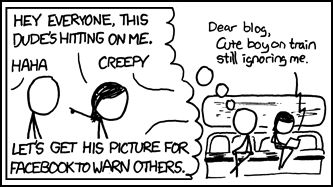Today’s XKCD strip bothers me, a little. It reminds me of the discussion about assertiveness amongst nerd guys brought up when Gabe and Tycho at Penny Arcade were talking about “pick-up artists” (PUAs) a while back.


Here’s my issue: I get that a lot of straight guys (and women, but I want to primarily talk about men here) who identify as nerds (or don’t, for that matter) have confidence issues, especially around romantic or sexual interests*. But I also think that messages like the XKCD strip really reinforce that idea of isolation and make the world out to be filled with potential mates — if only you’d just talk to them! There’s some truth here, in that it’s pretty hard to meet people if you find it hard to talk to communicate with others. But the more insidious, unintended message I’m seeing is one that just feeds into the PUA logic — given enough confidence and skills, all women are yours for the taking.
I know some people are probably going to think I’m reaching here, and are going to say that it’s just a comic, and maybe just meant to make a cute little statement about how everyone just wants to make a connection. Sure, and I think there’s something to be said for nerd guys shedding the whole Nice Guy complex and acting assertively. The problem is that there’s a fine line between that and the PUA viewpoint I described earlier. That woman next to you might not want to talk about her netbook. She might not be interested in you, specifically. She might not be interested in men, generally. She probably wouldn’t have the same reaction as in the strip, because society teaches women that they should expect male attention, and calling it out isn’t usually looked too kindly upon.
So this is the crux of the issue for me: nerds really are members of a subordinated masculinity, and from within that viewpoint it’s easy to dismiss anything which says that you are privileged and not downtrodden. Once you’re in that space, it’s really easy to start thinking in a certain way that says you’re not privileged just because you’re a man — and I think things like this XKCD strip can contribute to that way of thinking.
Of course, any man who falls farther from the pinnacle of hegemonic masculinity is less privileged than his more “masculine” counterparts, but he’s still a man. Nerd discourses sometimes let us forget that, and let us think we operate outside the system, because we’re not like those other, sexist guys — but it’s a fantasy. We can be better than that, but it means telling ourselves the truth, and not pretending that our interactions with women — even a simple conversation on a train — aren’t influenced and structured by the patriarchy.
*Note: I realize that I don’t mention queer nerds here. I don’t have a lot of experience with the topic, besides an understanding that nerd communities can be just as homophobic as more mainstream groups. Also, most of the discussions I’ve seen around nerd shyness have been in terms of male shyness towards women — summed up in the Nice Guy trope. I think this definitely speaks to the silencing of queer nerds in certain communities, but it also leads me to believe that this phenomenon is primarily an issue for a certain type of (self-identified) heterosexual masculinity.
—————————-
About his interests, Matt Kopas writes:
In a famous misattribution, Andre Malraux was held to ask “What is a man?” I feel like most of the answers to this question that men have available to them these days are at best outdated and at worst oppressive and restrictive. What does it really mean to be a man? How can men recognize their privilege and become better allies? As a first-year graduate student at the University of Washington, these are some of the questions I’m interested in. I blog about masculinity issues at The Disenchanted World, where I also talk about other topics such as sexuality, evolutionary theory, and really anything else that strikes me as sociologically interesting.
If you would like to write a post for Sociological Images, please see our Guidelines for Guest Bloggers.




